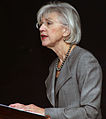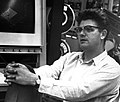University of Alberta
The University of Alberta (also known as U of A or UAlberta) is a public research university located in Edmonton, Alberta, Canada. It was founded in 1908 by Alexander Cameron Rutherford,[8] the first premier of Alberta, and Henry Marshall Tory,[9] the university's first president. It was enabled through the Post-secondary Learning Act.[10] The university is considered a "comprehensive academic and research university" (CARU), which means that it offers a range of academic and professional programs that generally lead to undergraduate and graduate level credentials.[11]
The university comprises four campuses in Edmonton, an Augustana Campus in Camrose, and a staff centre in downtown Calgary. The original north campus consists of 150 buildings covering 50 city blocks on the south rim of the North Saskatchewan River valley, across and west from downtown Edmonton. 39,000 students from Canada and 150 other countries participate in 400 programs in 18 faculties.
The university is a major economic driver for Alberta. In 2022, it contributed $19.4 billion to Alberta's economy, or over five per cent of that year's gross domestic product.[12] The University of Alberta has produced over 260,000 graduates; awards received by alumni and faculty members include 3 Nobel Prizes and 72 Rhodes Scholarships.
University rankings
91
111
99
109
169
136
4
4
5
4
5
The University of Alberta has 260,000 living graduates, 93 per cent of whom reside in Canada. Outside of Canada, the United States holds the greatest amount of alumni, nearly four per cent of all living graduates.[168] Alumni and former students have won awards, including 68 Rhodes Scholarships.[169] Distinguished alumni include Raymond Lemieux, awarded the Albert Einstein World Award of Science in 1992,[170] and former faculty member Malcolm Forsyth, three-time award winner of the Juno Award for Classical Composition[171] In the literary arts there are writers Aritha Van Herk, Caterina Edwards, and Joseph Pivato. The university is also associated with three Nobel laureates: alumnus Richard E. Taylor, who was awarded the Nobel Prize in Physics in 1990,[172] and faculty members Derek Walcott,[173] who was awarded the Nobel Prize in Literature in 1992, and Michael Houghton, who was awarded the Nobel Prize in Medicine in 2020.
A number of graduates have achievements in business, including Daryl Katz, chair of the Katz Group of Companies and owner of the Edmonton Oilers,[174] Bernard Ebbers, former CEO of WorldCom,[175] and Greg Zeschuk, and Ray Muzyka, co-founders of BioWare.[176] In academia, a number of faculty members and graduates also gained prominence including faculty member Ludwig von Bertalanffy, for his work systems theory,[177] and alumnus Tak Wah Mak, discoverer of the T-cell receptor.[178]
Eric Allan Kramer graduated from the University of Alberta with a Bachelor in Fine Arts. He is most notable in the role of Bob Duncan in the Disney Channel sitcom "Good Luck Charlie".
The author of the bestseller 12 Rules for Life: An Antidote to Chaos, Jordan Peterson, graduated from the University of Alberta with a Bachelor of Arts in Political Science (1982) and Psychology (1984).
Many former students have gained local and national prominence for serving in government. Alumnus Roland Michener served as the 20th Governor General of Canada.[179] The 16th Prime Minister of Canada, Joe Clark, also graduated from Alberta.[180] A number of graduates have served at the provincial level, as premiers and lieutenant governors, including George Stanley, the 25th Lieutenant Governor of New Brunswick and designer of the Canadian flag.[181] Lois Hole, the former chancellor of the university, served as the 15th Lieutenant Governor of Alberta.[182] Graduates who served as provincial premiers include Pat Binns, the 30th Premier of Prince Edward Island,[183] Peter Lougheed, the 10th Premier of Alberta,[184] Dave Hancock, the 15th Premier of Alberta, Jim Prentice, the 16th Premier of Alberta,[185] and Rachel Notley, the 17th Premier of Alberta.[186] Ed Stelmach, the 13th Premier of Alberta, attended the university but did not finish.[187] The third chancellor of the university, Alexander Cameron Rutherford, also served as the first premier of Alberta.[188] A number of graduates also held office in the Parliament of Canada, including Rona Ambrose, who served as the President of the Queen's Privy Council for Canada,[189] and David Emerson, who served as the Minister of Foreign Affairs.[190] In Nigeria Olawale Sulaiman is the special adviser to the Governor of Kwara State on health matters.[191]
The 17th Chief Justice of Canada, Beverley McLachlin, the first female chief justice, is a graduate from the university.[192] Other faculty and alumni who have served on Canada's highest court include Justice Henry Grattan Nolan, who served for a year before dying in 1957; Justice Ronald Martland, who served on the court for 24 years beginning in 1958; Justice Gérard Vincent La Forest, a former dean of law at the U of A who was elevated to the court in 1985 and served for 12 years; former law professor and alumnus Justice William Stevenson, who served two years on the court beginning in 1990; and former law professor Justice Russell Brown, who was named to the court in 2015.[193]
Violet King Henry was the first black woman lawyer in Canada, the first black person to graduate law in Alberta and the first black person to be admitted to the Alberta Bar. She was also the first woman named to a senior management position with the American national YMCA.







